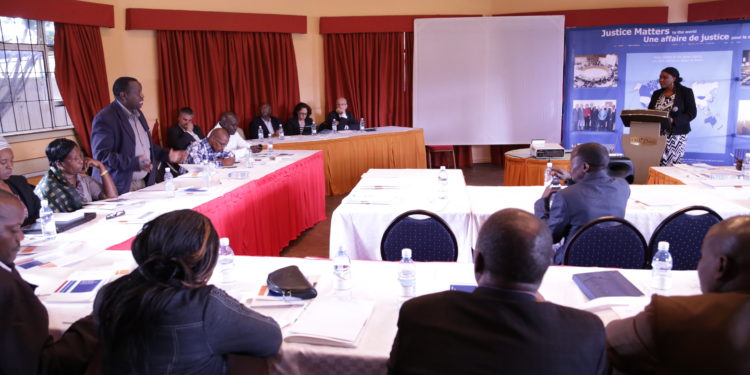By Susan Kendi
The victims of the violence that followed the disputed December 2007 presidential election in Kenya are back in the news. A lot of heat has been generated in Kenya about what to do with their cases.
This debate in Kenya about those victims is an opportunity to take a fresh look at what the International Criminal Court’s Trust Fund for Victims has done for them.
The renewed interest in the victims of violence that occurred between December 2007 and February 2008 began when Kenya’s top detective announced on November 23 that investigators had begun looking into new threats those victims said they had received in the recent past.
Director of Criminal Investigations George Kinoti said at a news conference on November 23 that investigators were taking statements from scores of victims of the violence that followed the disputed December 2007 presidential election. Kinoti said some of those victims were present at the news conference he held.
Kinoti said the Directorate of Criminal Investigations (DCI) took this action after the victims reported they had received threats in the recent past. Two days after Kinoti’s news conference, President Uhuru Kenyatta strongly opposed any efforts to “dig up graves that had been forgotten”, a statement that was interpreted as saying no investigation should be opened into the violence that followed the December 2007 presidential election.
Kenyatta did not name Kinoti in his speech that was a mix of Kiswahili and English. He did not even directly refer to what is commonly referred to the post-election violence of December 2007. But because he spoke on Wednesday, November 25 it was taken that he was criticizing Kinoti’s announcement two days earlier.
At the height of the violence that occurred between December 2007 and February 2008 more than 600,000 people were displaced from their homes in Kenya. A government-appointed commission that investigated the violence said 1,133 people were killed during that violence.
To date, the Trust Fund for Victims (TFV) has not done anything for any of these victims. The most that has happened is talk of the TFV rolling out an assistance programme in Kenya.
To that end, the TFV sent a fact-finding mission to Kenya last year. This mission was scheduled to submit an assessment report to the TFV board in December last year. What that report said or what the board decided after considering that report has not been made public to date.
The Trust Fund has two major roles. One role is to implement court-ordered reparations awards following the final conviction of an accused. The other role is to provide assistance to victims. This second role is executed on a voluntary basis. A TFV assistance programme is based on voluntary contributions from member states of the ICC.
In December last year, the then TFV Chairman, Felipe Michelini, explained to JFJ that the Trust Fund had not initiated an assistance programme in Kenya because insecurity in Kenya had made it hard to conduct an assessment and there were difficulties in implementing such programmes.
“If you want me to admit that of course, we should have stepped in faster that is true…The worst [thing] is to step in if you have no idea of what you are going to do because expectations are so high you know. So, in that sense we can assure that with a report, the board will have a decision and as soon as we have the decision, we will have serious steps like the assessment and calling for invitations to NGOs with local partners to implement those programmes with an amount of money that will be in the bank,” said Michelini. Later, in April this year, he died and was replaced by Mama Koité Doumbia as chair.
There had been expectations that once the ICC got involved in Kenya the TFV would roll out an assistance programme. The Office of the Prosecutor (OTP) formally began investigations in March 2010 into the post-election violence of December 2007 and February 2008. This was after a pre-trial chamber authorised the OTP to do so. The OTP announced its list of six suspects in December 2010 triggering pre-trial proceedings that eventually led to trial proceedings. The Kenya cases eventually collapsed in December 2015 and April 2016.
While the cases were active different civil society organisations questioned why the TFV had not began any assistance programmes in Kenya.
After the collapse of the Kenya cases, civil society experts and Ulster University’s Transitional Justice Institute came together to form what became called the Expert Group and developed The Nairobi Principles on Accountability. These principles are based on the experiences from the Kenya cases at the ICC. The Expert Group released the principles in January 2019.
In their justifications for the principles, the Expert Group regretted that the TFV had not meet the expectations of the victims in Kenya.
“To date, the Trust Fund for Victims has continued to raise expectations without offering any assistance to Kenyan victims. In the absence of clear criteria for deciding Trust Fund for Victims interventions, the Expert Group proposes that it becomes mandatory for the Trust Fund for Victims to conduct assessments in every situation country, in order to meaningfully determine victims’ needs for assistance, and to make the TFV’s decisions to intervene in certain situations and not in others more objective,” said the Expert Group.







